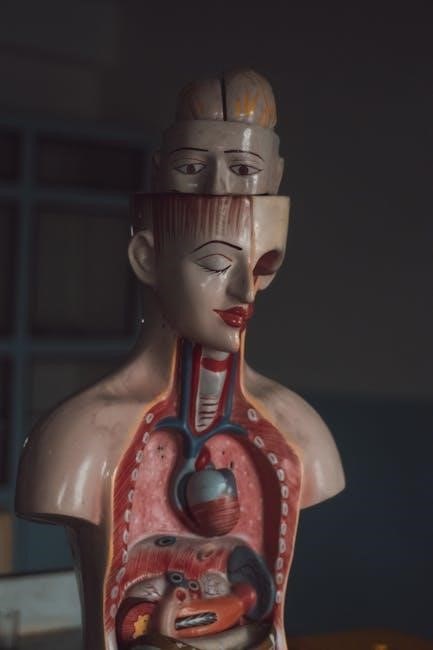The human body is a complex system composed of 11 major organ systems‚ each with unique functions essential for maintaining life. Understanding these systems and their roles is crucial for appreciating how the body operates efficiently. This guide provides an overview of these systems‚ focusing on their key functions and interconnections‚ offering a comprehensive understanding of human physiology.

The 11 Body Systems
The 11 body systems work together to maintain overall health. They include the circulatory‚ respiratory‚ digestive‚ nervous‚ and lymphatic systems‚ each playing a vital role in sustaining life and ensuring proper bodily functions daily.

2.1. Circulatory System
The circulatory system‚ also known as the cardiovascular system‚ is one of the 11 human body systems. Its primary function is to transport oxygen‚ nutrients‚ hormones‚ and waste products throughout the body. The system consists of the heart‚ arteries‚ veins‚ and capillaries‚ which form a network of blood vessels. The heart acts as the central pump‚ propelling blood through these vessels. The circulatory system plays a crucial role in maintaining homeostasis by delivering oxygenated blood to cells and organs and removing deoxygenated blood for oxygenation in the lungs. Additionally‚ it aids in the immune response by transporting white blood cells to areas of infection or injury. This system is vital for overall health‚ as it ensures that all cells receive the necessary resources for proper functioning. Its efficiency directly impacts the body’s ability to function‚ making it one of the most essential systems in human anatomy.
2.2. Respiratory System
The respiratory system is one of the 11 human body systems‚ primarily responsible for exchanging oxygen and carbon dioxide through the process of breathing. It consists of the nose‚ trachea‚ bronchi‚ lungs‚ and diaphragm. When air is inhaled through the nose or mouth‚ it passes through the trachea and into the bronchi‚ which branch into the lungs. The air then reaches the alveoli‚ tiny sacs where gas exchange occurs: oxygen diffuses into the bloodstream‚ while carbon dioxide is removed. This process is essential for delivering oxygen to cells and organs‚ supporting metabolic activities. The respiratory system also filters‚ warms‚ and humidifies the air we breathe‚ protecting the body from harmful particles. Its proper functioning is vital for overall health‚ as it directly impacts energy production and the removal of waste products. Without the respiratory system‚ the body cannot sustain life‚ making it a cornerstone of human physiology and survival.
The human body is a fascinating organism composed of 11 major organ systems‚ each designed to perform specific functions that collectively sustain life. These systems‚ including the circulatory‚ respiratory‚ digestive‚ and lymphatic‚ among others‚ work in harmony to maintain bodily functions such as breathing‚ nutrient absorption‚ and waste removal. The interdependence of these systems ensures that the body operates efficiently‚ enabling individuals to move‚ think‚ and respond to their environment. Understanding the roles and interactions of these systems is crucial for appreciating the complexity of human physiology. This guide provides a comprehensive overview of the 11 human body systems‚ focusing on their functions and significance. By exploring these systems‚ readers can gain insights into the remarkable mechanisms that keep the body healthy and functioning optimally. This knowledge serves as a foundation for understanding how to maintain overall well-being and address potential health challenges.

The 11 Human Body Systems
The human body comprises 11 interconnected systems‚ each performing unique roles to sustain life. Their collective function ensures proper bodily operations‚ from circulation and respiration to digestion and immune defense‚ maintaining overall health.
2;1. Circulatory System: Function
The circulatory system‚ also known as the cardiovascular system‚ plays a vital role in transporting oxygen‚ nutrients‚ and hormones to cells while removing waste products. It consists of the heart‚ arteries‚ veins‚ and capillaries. The heart acts as a pump‚ propelling blood through the vessels. Arteries carry oxygenated blood away from the heart to tissues‚ while veins return deoxygenated blood to the heart. Capillaries facilitate the exchange of substances between blood and cells. This system also supports immune function by transporting white blood cells and aids in maintaining body temperature. Proper circulation ensures that organs and tissues receive the necessary resources for optimal functioning‚ making it essential for overall health and survival. Its efficiency is crucial for supporting physical activity‚ recovery‚ and maintaining homeostasis within the body. Without a functional circulatory system‚ cells would be unable to obtain the nutrients and oxygen required for survival‚ leading to severe health complications. Its role is indispensable in sustaining life and enabling bodily functions.
2.2. Circulatory System: Importance
The circulatory system is vital for sustaining life‚ as it ensures the delivery of oxygen and nutrients to cells and the removal of waste products. Its importance lies in its role as the body’s transportation network‚ enabling cellular respiration and metabolic processes. Without it‚ cells would rapidly die from oxygen deprivation and toxin buildup. It also plays a critical role in immune defense by transporting white blood cells to combat infections. Additionally‚ the circulatory system regulates body temperature and maintains homeostasis‚ ensuring proper bodily functions. Its failure can lead to severe health issues‚ such as heart disease‚ stroke‚ and organ failure. Thus‚ the circulatory system is essential for overall health‚ supporting physical activity‚ recovery‚ and the body’s ability to respond to stress. Its efficient operation is fundamental to maintaining life and enabling the body to function optimally under various conditions. Its importance cannot be overstated‚ as it is a cornerstone of human physiology and survival.
2.12. Lymphatic System: Importance
The lymphatic system is a cornerstone of the body’s defense mechanism‚ playing a pivotal role in immune function‚ detoxification‚ and overall health. Its importance lies in its ability to protect the body from infections by filtering lymph fluid and trapping pathogens‚ such as bacteria and viruses‚ in lymph nodes. This system also aids in the absorption of fats and fat-soluble vitamins from the digestive tract‚ ensuring proper nutrition and energy production. Additionally‚ the lymphatic system is crucial for waste removal‚ preventing toxins from accumulating in tissues and maintaining cellular health. It supports the circulatory system by returning excess fluids to the bloodstream‚ preventing swelling and edema. Furthermore‚ it plays a key role in the body’s ability to recover from illness and injury by facilitating the transport of immune cells. Without the lymphatic system‚ the body would be highly susceptible to disease and unable to maintain homeostasis‚ making it essential for survival and optimal bodily function.

The human body is an intricate organism composed of 11 major organ systems‚ each designed to perform specific functions essential for survival. These systems work collaboratively to maintain homeostasis‚ enabling the body to function efficiently. Understanding these systems is fundamental for grasping human physiology and appreciating the complexity of life. The circulatory‚ respiratory‚ digestive‚ nervous‚ and other systems each play a vital role in sustaining health. This guide provides an overview of the 11 human body systems‚ focusing on their primary functions and interconnections. By exploring these systems‚ individuals can gain insights into how the body operates and the importance of maintaining overall wellness. This knowledge is essential for both educational purposes and for adopting healthy lifestyle choices. The study of these systems reveals the remarkable interconnectedness of the human body and the significance of each system in ensuring proper bodily functions.

Circulatory System
The circulatory system‚ also known as the cardiovascular system‚ is responsible for transporting oxygen‚ nutrients‚ and hormones throughout the body. It consists of the heart‚ blood vessels‚ and blood‚ ensuring proper bodily functions and overall health.
2;1. Function
The circulatory system’s primary function is to circulate blood throughout the body‚ delivering oxygen and nutrients to tissues and organs while removing carbon dioxide and other waste products. This process is essential for cellular respiration and maintaining homeostasis; The heart acts as the central pump‚ propelling blood through arteries‚ veins‚ and capillaries. Arteries carry oxygen-rich blood away from the heart to the body’s tissues‚ while veins return oxygen-depleted blood to the heart. Capillaries facilitate the exchange of substances between blood and tissues. Additionally‚ the circulatory system aids in hormone distribution‚ immune cell transport‚ and thermoregulation. Without its efficient operation‚ cells would not receive the necessary resources for survival‚ and waste removal would be impaired‚ leading to potential organ dysfunction and disease.

Respiratory System
The respiratory system’s primary function is to bring air into the body‚ exchange oxygen for carbon dioxide through respiration‚ and maintain proper pH balance. It ensures oxygen is delivered to cells for energy production.
3.1. Function
The respiratory system facilitates the exchange of oxygen and carbon dioxide through breathing. Air enters via the nose or mouth‚ passes through the trachea‚ and reaches the lungs‚ where alveoli enable gas exchange. Oxygen diffuses into the bloodstream‚ binding to hemoglobin in red blood cells‚ while carbon dioxide is expelled. This process sustains cellular respiration‚ providing energy for bodily functions. Additionally‚ the respiratory system regulates pH levels by expelling excess carbon dioxide‚ maintaining acid-base balance. It also filters‚ warms‚ and humidifies incoming air‚ protecting the body from pathogens and environmental extremes. Proper respiratory function is vital for overall health‚ supporting metabolic activities and ensuring the body’s cells receive the oxygen necessary for energy production. dysfunction in this system can lead to conditions like asthma or chronic obstructive pulmonary disease (COPD)‚ highlighting its critical role in maintaining life and bodily functions.

Lymphatic System
The lymphatic system supports immunity by filtering lymph and aiding in the removal of pathogens and waste. It also maintains fluid balance and transports nutrients‚ playing a vital role in overall health and immune defense.
12.1. Function
The lymphatic system plays a crucial role in maintaining the body’s immune defense and overall health. Its primary functions include filtering lymph‚ a clear fluid that circulates through the lymphatic vessels‚ to remove pathogens‚ waste‚ and excess proteins. This system also aids in the transport of nutrients and oxygen to cells while removing waste products. Additionally‚ it supports the immune system by housing lymphocytes‚ such as B and T cells‚ which are vital for fighting infections. The lymphatic system also helps maintain fluid balance by returning excess fluids from tissues to the bloodstream‚ preventing swelling and ensuring proper circulation. Furthermore‚ it plays a role in detoxification by filtering out harmful substances and aiding in their elimination. Overall‚ the lymphatic system is essential for protecting the body against disease‚ maintaining fluid balance‚ and supporting the body’s nutritional needs.
